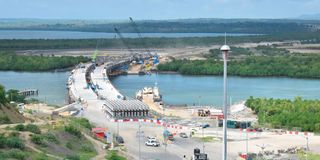Mombasa port project set for early finish on President Ruto directive

Ongoing construction at Mwache Bridge in Mombasa last May. It is part of the Mombasa Port Development Project.
Completion of the Sh39 billion Dongo Kundu Special Economic Zone, whose establishment is expected to boost export volumes, has been brought forward to 2025.
The special economic zone, which is a key pillar of the Mombasa Port Development Project, is geared towards expanding the port’s capacity and improving logistics along the Northern Corridor and was scheduled for completion in 2028. The new deadline was announced by President William Ruto on New Year’s Eve.
“I want this project to be done by 2025 to create jobs for the youth in agro-processing, value addition and manufacturing,” he said while stressing the importance of these sectors for the country’s economic growth.
In the past 10 years, he said, Kenya’s manufacturing output had declined from nine per cent of GDP to seven per cent.
“We have agreed that we are going to change the trajectory and ... by 2030, 20 per cent of the GDP will be [comprise economic output from] industrialisation, manufacturing, agro-processing and value addition,” he said.
The president also highlighted the potential for the Dongo Kundu project to increase the value of the products that Kenya sells by processing them locally, rather than exporting them in an unprocessed state.
“Once complete, the special economic zone will ensure that the products that the country has been selling unprocessed are processed to increase their value,” he said. Even as the President brings forward the deadline for its completion, a lobby has sued the government over the project, citing environmental concerns.
African Centre for Corrective and Preventive Action has argued in its suit filed before a Mombasa court that, once complete, the project would lead to the production of industrial waste, which is likely to be deposited into the ocean posing a danger to marine life and human health and contaminating water tables.
“The proposed project primarily involves massive dredging of the ocean’s causeway, land reclamation ... the destruction of the natural extensive mangrove forests and other indigenous trees species, revetment of the ocean waters natural causeways, amongst other activities, which are likely to adversely affect the environment and the oceans’ intricate biodiversity,” said African Centre for Corrective and Preventive Action Director James Macharia.
Ongoing case
The lobby wants the court to issue an order stopping the government from commencing the project until the case it has filed is heard and determined.
Mr Macharia has also protested that the award of the tender was done in secrecy, as no public participation had been done and that the indigenous communities were not involved.
He also laments that no Environmental Impact Assessment report has been provided to the residents, depriving them of their right to information for a project that is of public interest.
In addition to the Dongo Kundu project, the Head of State also announced that the government is planning to address other challenges facing the country, including the lack of affordable housing and water shortages.
Dr Ruto announced that the government will construct 200,000 housing units every year, with the goal of making it possible for low-income earners to own their own homes. To address the issue of water shortages, the President announced that the government will begin building dams under a public-private partnership initiative in March that will see the first 100 dams built in the first phase and 500 in the second.





